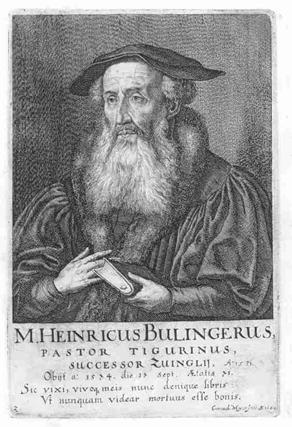A scene from The Canterbury Psalter (12th century)
Blog
“One Fire: Light, Brightness, and Heat” (Bullinger on the Trinity)

Swiss Reformer Henry Bullinger (1504–1575) concludes his sermon “Of the Holy Ghost” (Decades, IV:7) with a wonderfully clear and compelling recapitulation of “Unity in trinity and Trinity in unity” (interestingly capitalized thus in the ET).
His opening gambit is a statement of the way Scripture speaks distinctly of the characteristic workings of the Father, Son, and Spirit: “In the scripture, the beginning of doing, and the flowing fountain and well-spring of all things, is attributed to the Father. Wisdom, counsel, and the very dispensation in doing things, is ascribed to the Son. And the force and effectual power of working, is assigned to the Holy Ghost.” (p. 326) Using this imagery and vocabulary, Bullinger conveys sharp, distinct impressions of the three persons in their work. The Father as beginning and well-spring; the Son as wisdom and dispensation (oikonomia/dispensatio; we might say arrangement or pattern); and the Spirit as the effectual power. These clusters of ideas give us miniature portraits of the three, and we can consider each of them somewhat distinctly.
Immediately, though, Bullinger moves to balance this distinct “Trinity in unity” with a corresponding “Unity in trinity:” “Nevertheless, let us take heed lest through the distinction, we separate the unity of the substance of God; for there is but one God in whom those properties exist.” With this warning, Bullinger draws us back to note that the distinctness that just appeared to our minds is not separation or independence; it is distinctness within the oneness. In fact, given the “unity of the substance” of God, even what he calls distinct “properties” of the three are properties in a qualified and relative sense: the three are not different entities, existing separately and each having properties of their own. Their properties are points of distinction in an essential oneness. Bullinger indulges in an extended illustration of the point: God is like a fire.
It is but one fire, even though there are three things seen in it: light, brightness, and heat. For these rise together, and cease all at once. The light does not go before the brightness, nor the brightness before the heat. And though one thing is attributed to the light, another to the brightness, and a third to the heat; yet they work inseparably.
The limits of the illustration are obvious enough, and Bullinger even highlights the limit by saying that in fire, light, brightness and heat “rise together, and cease all at once.” In the case of God, it is nonsense to ponder how the three come to be or cease. The point of the illustration is their inseparable unity, and their undivided operation: “they work inseparably.”
Bullinger’s final move is to specify what inseparable trinitarian operation entails about the work of God. His main point is that all three persons are behind the work that we, following Scripture, attribute or appropriate to any of the persons:
Therefore, when we read that God created the world, we understand that the Father from whom are all things, by the Son by whom are all things, in the Holy Ghost in whom are all things, created the world.
And when we read that the Son became flesh, suffered, died, and rose again for our salvation, we believe that the Father and the Holy Ghost, though they were not partakers of his incarnation and passion, yet notwithstanding, they wrought our salvation by the Son, whom we believe never to have been separated from them.
And when sins are said to be forgiven in the Holy Ghost, we believe that this benefit and all other benefits of our blessedness, are inseparably given and bestowed upon us from one, only, true, living, and everlasting God, who is the Father, the Son, and the Holy Ghost. To whom be praise and thanksgiving for ever and ever. Amen.
It is typical of Bullinger’s doctrinal comprehensiveness that this final summary contains, in nuce, the doctrines of creation, incarnation, and salvation; all properly ordered within the Trinity in unity and the Unity in trinity.
About This Blog

Fred Sanders is a theologian who tried to specialize in the doctrine of the Trinity, but found that everything in Christian life and thought is connected to the triune God.


